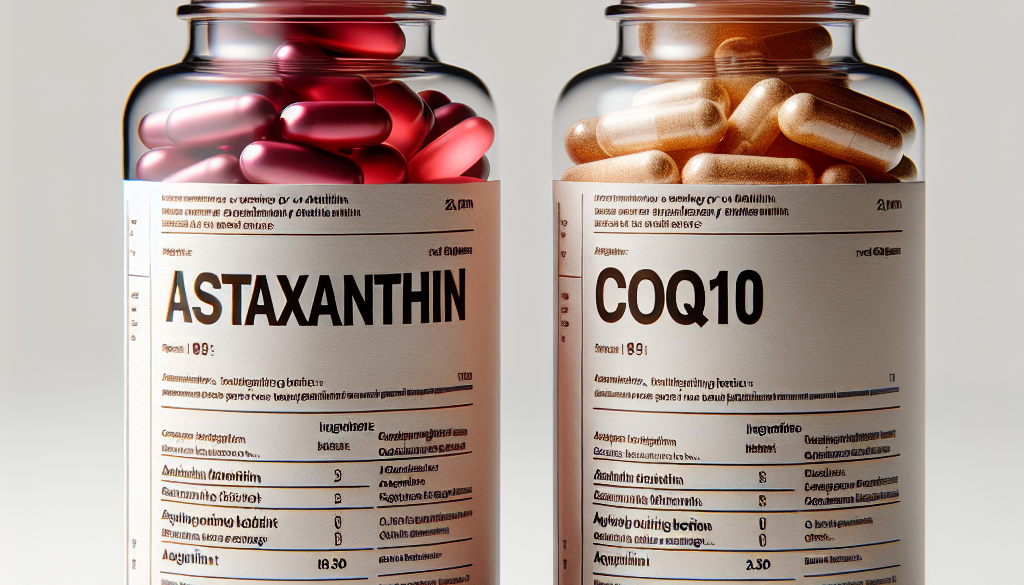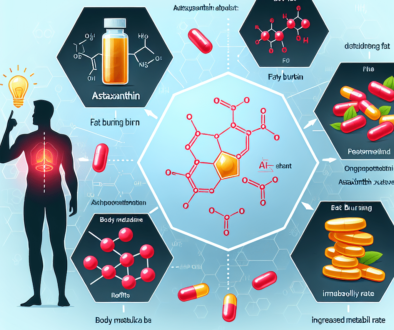Can I Take Astaxanthin Instead Of Coq10?
-
Table of Contents
- Astaxanthin vs. CoQ10: Can You Make the Switch?
- Understanding Astaxanthin
- Coenzyme Q10 (CoQ10) Explained
- Comparing Astaxanthin and CoQ10
- Antioxidant Strength
- Heart Health
- Skin and Eye Health
- Exercise Performance and Recovery
- Can You Take Astaxanthin Instead of CoQ10?
- Conclusion: Making an Informed Decision
- Enhance Your Health with ETprotein’s Premium Protein Products
Astaxanthin vs. CoQ10: Can You Make the Switch?

When it comes to supplements, there’s a plethora of options available for those looking to enhance their health and wellbeing. Two popular supplements that often come up in discussions are Astaxanthin and Coenzyme Q10 (CoQ10). Both are known for their antioxidant properties and potential health benefits, but can one replace the other? This article delves into the science behind Astaxanthin and CoQ10, comparing their benefits, uses, and whether it’s advisable to take Astaxanthin instead of CoQ10.
Understanding Astaxanthin
Astaxanthin is a carotenoid pigment found in certain marine plants and animals. It’s what gives salmon, shrimp, and flamingos their pinkish hue. Unlike some other antioxidants, Astaxanthin is able to cross the blood-brain and blood-retinal barriers, which may allow it to protect the brain and eyes from free radical damage.
- Powerful antioxidant properties
- Supports skin health and reduces signs of aging
- May improve endurance and exercise recovery
- Potential to protect against UV radiation
- Supports eye health
Coenzyme Q10 (CoQ10) Explained
CoQ10 is a compound found in every cell of the body. It’s essential for the production of energy within cells and also functions as an antioxidant. CoQ10 levels naturally decline with age, and supplementation is often recommended for various health conditions.
- Crucial for cellular energy production
- Antioxidant properties
- May benefit heart health
- Could help with migraine prevention
- Supports exercise performance
Comparing Astaxanthin and CoQ10
While both Astaxanthin and CoQ10 are antioxidants, they have different roles in the body. CoQ10 is primarily involved in energy production and is found in high concentrations in organs with high energy demands, such as the heart, liver, and kidneys. Astaxanthin, on the other hand, is not involved in cellular energy production but is renowned for its ability to combat oxidative stress and inflammation.
Antioxidant Strength
One of the key differences between Astaxanthin and CoQ10 is their relative antioxidant strength. Astaxanthin is often cited as being a more powerful antioxidant when compared to CoQ10 and other carotenoids. This could potentially make Astaxanthin a better choice for those specifically looking for antioxidant support.
Heart Health
Both supplements have been studied for their cardiovascular benefits. CoQ10, in particular, has been shown to improve symptoms of congestive heart failure and may help reduce blood pressure. Astaxanthin also has potential heart health benefits, such as improving arterial elasticity and reducing oxidative stress, which are important factors in cardiovascular disease prevention.
Skin and Eye Health
Astaxanthin has been praised for its ability to protect the skin from UV damage and improve skin elasticity, moisture levels, and smoothness. It’s also been shown to support eye health, potentially reducing the risk of age-related macular degeneration. CoQ10 may also benefit skin health by reducing the damage from internal and external agents by increasing energy production in skin cells and promoting antioxidant protection.
Exercise Performance and Recovery
Both supplements have been linked to improved exercise performance and recovery. CoQ10’s role in energy production makes it a popular supplement among athletes, while Astaxanthin’s anti-inflammatory and antioxidant properties may help reduce muscle damage and fatigue.
Can You Take Astaxanthin Instead of CoQ10?
Deciding whether to take Astaxanthin instead of CoQ10 depends on your individual health goals and needs. If you’re considering switching from CoQ10 to Astaxanthin, it’s important to understand that while they both have antioxidant properties, they serve different functions in the body.
For those focused on enhancing skin health, protecting against UV radiation, or supporting eye health, Astaxanthin might be the preferred choice. However, if your primary concern is cellular energy production or supporting heart health, CoQ10 could be more beneficial.
It’s also worth noting that these supplements can be taken together, as they complement each other’s actions. Before making any changes to your supplement regimen, it’s advisable to consult with a healthcare professional, especially if you have pre-existing health conditions or are taking medication.
Conclusion: Making an Informed Decision
In conclusion, while Astaxanthin and CoQ10 share some similarities, they are not interchangeable. Each has unique benefits that cater to different health concerns. Understanding your personal health goals is key to determining which supplement, or combination of supplements, is right for you. Always consult with a healthcare provider before making any significant changes to your supplement intake.
Enhance Your Health with ETprotein’s Premium Protein Products
If you’re looking to complement your supplement routine with high-quality protein products, consider ETprotein’s range of organic bulk vegan proteins and L-(+)-Ergothioneine (EGT). Their products are designed to meet the needs of various industries, including nutraceuticals, pharmaceuticals, and food and beverage sectors. With a commitment to non-GMO, allergen-free ingredients, ETprotein ensures that you’re getting the best in protein supplementation.
About ETprotein:
ETprotein, a reputable protein and L-(+)-Ergothioneine (EGT) Chinese factory manufacturer and supplier, is renowned for producing, stocking, exporting, and delivering the highest quality organic bulk vegan proteins and L-(+)-Ergothioneine. They include Organic rice protein, clear rice protein, pea protein, clear pea protein, watermelon seed protein, pumpkin seed protein, sunflower seed protein, mung bean protein, peanut protein, and L-(+)-Ergothioneine EGT Pharmaceutical grade, L-(+)-Ergothioneine EGT food grade, L-(+)-Ergothioneine EGT cosmetic grade, L-(+)-Ergothioneine EGT reference grade and L-(+)-Ergothioneine EGT standard. Their offerings, characterized by a neutral taste, non-GMO, allergen-free attributes, with L-(+)-Ergothioneine purity over 98%, 99%, cater to a diverse range of industries. They serve nutraceutical, pharmaceutical, cosmeceutical, veterinary, as well as food and beverage finished product distributors, traders, and manufacturers across Europe, USA, Canada, Australia, Thailand, Japan, Korea, Brazil, and Chile, among others.
ETprotein specialization includes exporting and delivering tailor-made protein powder and finished nutritional supplements. Their extensive product range covers sectors like Food and Beverage, Sports Nutrition, Weight Management, Dietary Supplements, Health and Wellness Products, and Infant Formula, ensuring comprehensive solutions to meet all your protein needs.
As a trusted company by leading global food and beverage brands and Fortune 500 companies, ETprotein reinforces China’s reputation in the global arena. For more information or to sample their products, please contact them and email sales(at)ETprotein.com today.











